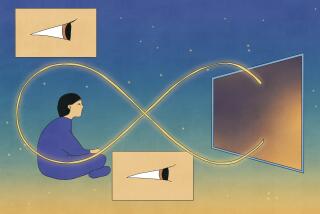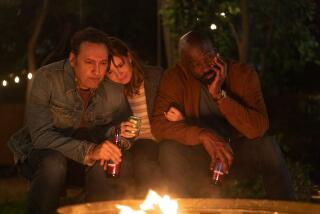Critics’ Exchange: ‘Breaking Bad,’ an epistolary epilogue
Times television critics Mary McNamara and Robert Lloyd trade a few emails on the subject of “Breaking Bad.”
Mary: I just read your “final thoughts piece” and fear we are the only two TV critics in America who didn’t love “Breaking Bad” with an unwavering love deep and true. I admire it tremendously, like I admire the works of Nathaniel Hawthorne or the films of Fellini. I think, and wrote, that the finale may be the first truly perfect television finale ever, doing all the business finales must do but in a way that was both lovely to watch and utterly true to the series as a whole. But the show never made my heart sing the way other shows have, and it never made me think of anything much beyond the mechanics of its own story. A rich and textured subject field, but still. Others were taken by the Big Questions “Breaking Bad” seemed to ask, about morality and mortality, about the individual vs. the family, but from the moment Walter White turned down the really good job offered him because it stank a bit of pity in favor of manufacturing crystal meth, he was not the man for me. (Maybe I know too many people whose lives were destroyed by meth?)
After that choice, his descent into moral corruption and violence seemed inevitable, so the question became how long could the show sustain a theme of rot? Five seasons it would seem; no one will ever accuse “Breaking Bad” of outstaying its welcome, which alone makes it worthy of several prizes. But though the horror/humor of the early seasons, and Bryan Cranston’s unique ability to toggle between the two, was masterful, I didn’t really care what happened to Walt. And at some point, we all became very aware of Vince Gilligan, the show’s creator, which is a good and bad thing — good because it’s time, by God, writers got a little respect around here and bad because, well, when you start thinking about the mind behind the story, the story loses some of its magic.
PHOTOS: ‘Breaking Bad’ scenes | Every season, every episode
All that said, I stick with the consensus that “Breaking Bad” is one of the most important shows ever made (I don’t know what to do with the word “best” in such a vast and gorgeously diverse world). Not only was it an archetypal story well and completely told, it also has forced the audience to contemplate television with the same eye they bring to other, “higher” art forms. The discussions around this show, passionate, literate, wildly entertaining discussions, have taken “Breaking Bad” and television to a whole new level of collective consideration.
Robert: I think we are more or less on the same page with “Breaking Bad,” love-wise, and it does seem at times that it is a page on which we sit alone. That is not quite the case, if you gaze around — there are other dissenters out there — but the many echoing cries of “Greatest. Show. Ever,” from professional and armchair critics alike, could make it feel, if you dissented even a whit, that you were watching the most gaily painted bandwagon in history pull through town without you. Like you, I’ve admired the show without quite embracing it — or perhaps embracing it and then relaxing my embrace — at the same time watching (and not “hate-watching,” either) every single episode. And that I can’t think of many other shows I would watch so faithfully after losing interest (again, like you) in the fate of its main character does in fact say something for its excellence.
As to Vince Gilligan, I don’t think his public profile was any sort of stumbling block for me. Indeed, I’ve enjoyed reading interviews with him all along; that he seemed to have a firm grasp on his characters and what they meant to him and the story may be part of what kept my interest up. And, of course, we live increasingly in a creator-identified age of television (David Chase, David Milch, David Simon, David E. Kelley, and some writers not named David — Shonda Rimes, there’s one), and in an age in which, because of the bottomlessness of the Internet, everything is discussed and discussed again. But certainly the running commentary, and the show that follows a show to talk about the show it follows, is a new kind of thing. Did you ever watch “Talking Bad”? I must confess I did not.
PHOTOS: Behind the scenes of ‘Breaking Bad’
Mary: I did watch “Talking Bad,” just as I’ve watching “Talking Dead,” which came first. And sometimes it was good and sometimes not so much, mainly because it was so relentlessly positive — “Could you believe.....!?!” “No, I could not believe....!!!” — which got a little wearing. Not every episode was a masterpiece, Chris Hardwick! There was, though, a terrific moment on the third-to-last episode. Dean Norris, whose character Hank had just been killed, came on to “Talking Bad.” Hardwick was, of course, horrified! devastated! heartbroken! over Hank’s death, and so he asked Norris what the experience had been like. Did he hang around the set? Mourn at the hotel? Call his mom? Norris explained that, fortunately, they had been able to do the part of the scene that required him in one take, which meant he got off-set ahead of schedule and so was able to catch an earlier flight to the set of “Under the Dome,” where he was filming the next day. It was such a lovely matter-of-fact description of what is, you know, someone’s job that it quite took my breath away. Here’s everyone hyperventilating about the death of Hank, and Norris is like, “Yes! One take and now I can get to the next hotel before midnight.” He did say he was grateful that Hank went out like a pro, as were we all.
I think the fact that you and I, who often but don’t always agree on things, so consistently admired where we did not love is a testament to the power of the show. Not every work of art moves everyone, but that doesn’t mean it isn’t a masterpiece. Television, like pop music, has always seemed more closely hitched to our emotions than most art forms. As has been said a hundred times before, it comes into our home; it has, in the past, organized our days and nights, and we form intimate ongoing bonds with “our” shows. We will forgive what we realize is shoddy work if it makes us laugh or soothes us in some way. But now, more than ever it seems, there is an increasing number of shows that can be admired and criticized as art with no strings attached. That this is occurring at the same time that passions for TV often near hysteria only adds to the general pleasure of our job.
Robert: Yes, this is a new age of television — not the age of the “best-ever television,” necessarily (not everything that looks good now will hold up), but an age in which there is a kind of general agreement between creators, critics and viewers that it is OK to take these things seriously. (I would call “The Honeymooners” a work of art as much as I would “Breaking Bad,” but that is not how anyone would have discussed it in its time.) “Breaking Bad” is a product of that permission, of those laboratory conditions and of the story we tell ourselves — and, more than ever, tell each other — about TV now.
PHOTOS: Before they were actors on ‘Breaking Bad’
And the product of talented people, obviously. (Not every AMC, or basic-cable, or even premium-cable series is a “Breaking Bad” or a “Mad Men.”) I was thinking about that other, pre-Third Golden Age series that Gilligan came out of, “The X-Files,” and picturing Walter White as a kind of non-supernatural version of the monsters that series weekly featured, luckless humans transformed by fate into something powerful and tragic beyond their own control. He had more agency in his downfall, of course. But the elements were there. (A cancer diagnosis seems a very “X-Files” way to begin.) And there was a Jekyll & Hyde quality to Walt, of course; and though Hyde always wins, as in the “Breaking Bad” finale, Jekyll gets a little last look-in at the end. Everyone talks about “The Sopranos” as the beginning of modern television, but “The X-Files” to me is where we first see mood used to help tell a TV story, as well as a watershed of long-arc storytelling (albeit in the context of a highly episodic series).
In any case, whatever you and I felt about “Breaking Bad,” however much less invested we were in its ups and downs and ins and outs than some critics and many fans, it is obviously both a substantial thing in itself and a stepping stone to other marvelous things none of us can predict. TV drama has a shorter shelf life than comedy; it’s more subject to stylistic wear, you might say, and the Great Acting of one age can look mannered or hammy in a later one. It would be interesting to know how these shows will play 50 years from now. I won’t be here to find out, however, unless it’s as a head in a jar, “Futurama”-style. In which case, I will have a lot of time to watch television.
More to Read
The complete guide to home viewing
Get Screen Gab for everything about the TV shows and streaming movies everyone’s talking about.
You may occasionally receive promotional content from the Los Angeles Times.








